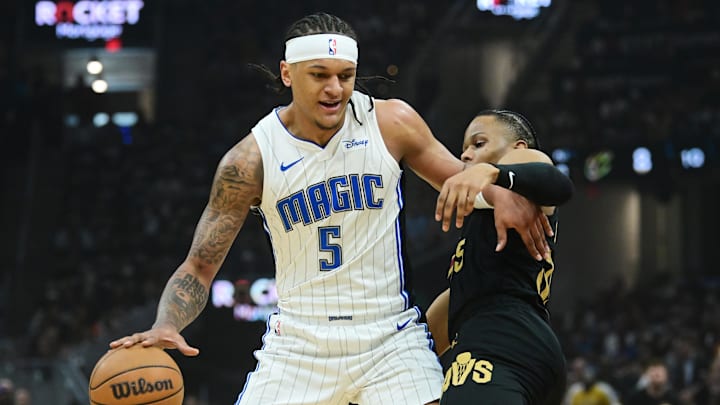2. Diversity of offense
The Orlando Magic were not a strong offensive team this season. They ranked 22nd in the league in offensive rating and had the worst offense in the league among teams that reached the postseason.
Of course, the Playoffs are their own animal. Being able to focus on one specific matchup means trying to find a way to attack and just make their way. Both the Orlando Magic and the Cleveland Cavaliers struggled offensively against elite defenses.
Both teams were trying to find ways to attack. And both teams kept running into the same wall.
With two elite defenses, the offenses got very stagnant and reliant on their star players. Game 7 was a lesson in stardom with Paolo Banchero scoring 24 of his 38 points in the first half and Donovan Mitchell followed up a 50-point Game 6 with 39 points. The difference in Game 7 was the contributions from Caris LeVert off the bench and the timely shot from Darius Garland.
The Magic just did not have that from Franz Wagner (1 for 15) or Jalen Suggs (2 for 13). Orlando needed just a little bit more.
But the offensive struggles throughout the series revealed another issue with the team. They had only one way to attack and one way to create scoring opportunities. The Cavs learned quickly how they could trap and attack Banchero, leading him to 4.6 turnovers per game in the series.
Orlando lacked offensive diversity and variability.
At home, the Magic were able to spread out and hit shots. On the road, they were not. And so it often felt like Banchero was slamming into a wall entering the paint on the road. And the team could not create -- or did not trust -- any other way to get the shots it typically highlights.
The numbers bear this out.
The Magic averaged 48.5 drives per game during the regular season, scoring 29.0 points per game and shooting 48.9 percent from the floor, according to data from Second Spectrum. In the Playoffs, the Magic averaged 51.3 drives per game, scoring 25.1 points per game and shooting 43.5 percent.
This shows how the Cavaliers did a good job forcing the Magic into the kinds of shots the Magic were uncomfortable with -- the 3-point shooting above and then difficult and forced shots at the rim.
Orlando averaged 51.8 points in the paint per game during the regular season but just 37.7 per game in the Playoffs against Cleveland.
The Magic found some success shooting in the mid-range -- 37.6 percent shooting on 9.5 attempts per game in the mid-range during the regular season and 50.6 percent shooting on 12.1 attempts per game in the Playoffs.
It shows that there can be some better offense. But the Magic are going to have to be more patient and diverse with their attack to get the kind of looks they are comfortable with. And certainly, in the playoffs, Orlando has to show that patience and discipline.
